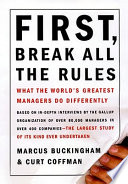

Great managers play a crucial role in the success of organizations by focusing on individual strengths rather than weaknesses. They understand that every employee has unique talents and capabilities, and the best way to motivate them is to align their roles with these strengths. This approach not only enhances employee satisfaction but also drives performance. By fostering an environment where employees can thrive, managers can cultivate a culture of engagement and productivity. The book emphasizes that effective management is not about enforcing rules but about breaking them to create customized paths for each employee.
Continue readingEmployee engagement is a significant predictor of organizational success. The book highlights that engaged employees are more productive, provide better customer service, and are less likely to leave the company. Engaged employees feel a sense of belonging and commitment to their organization, which leads to higher performance levels. The authors argue that managers should focus on creating conditions that foster engagement by recognizing individual contributions, providing opportunities for growth, and cultivating a supportive work environment.
Continue readingThe authors identify four essential elements that contribute to employee engagement: clarity of expectations, opportunities for development, recognition for contributions, and a supportive work environment. Clarity of expectations ensures that employees know what is required of them, which reduces ambiguity and increases confidence. Opportunities for development allow employees to grow their skills and advance in their careers. Recognition for contributions reinforces positive behavior and motivates employees to perform at their best. Lastly, a supportive work environment promotes collaboration and trust, essential components for a thriving workplace.
Continue readingThe book advocates for hiring based on talent rather than experience or qualifications. Traditional hiring practices often prioritize resumes and formal education, but this approach can overlook individuals with the innate abilities that align with the job's demands. The authors argue that talent is a better predictor of success than experience, and organizations should focus on identifying individuals with the right natural talents and potential. This shift in hiring philosophy can lead to a more dynamic workforce that can adapt and excel in various roles.
Continue readingFeedback is a critical component of employee development and engagement. The book emphasizes that managers should provide regular, constructive feedback to their employees to help them understand their performance and areas for improvement. This feedback should be specific, timely, and focused on behaviors rather than personal attributes. By creating a culture of open communication, managers can help employees feel valued and supported, which in turn fosters a more engaged and productive workforce.
Continue readingA strong workplace culture is essential for attracting and retaining talent. The authors argue that organizations with a positive culture see higher levels of employee satisfaction, engagement, and performance. A strong culture aligns the values and behaviors of employees with the organization's mission, creating a sense of purpose and belonging. Managers play a vital role in shaping this culture by modeling desired behaviors, promoting shared values, and ensuring that the workplace is inclusive and supportive.
Continue readingFlexibility in management is crucial for adapting to the diverse needs of employees. The book suggests that managers should be willing to break conventional rules and practices to meet individual employee needs. This may involve offering flexible work arrangements, personalized development plans, and tailored recognition strategies. By being flexible, managers can create a more inclusive and supportive environment that empowers employees to perform at their best.
Continue readingThe reading time for First, Break All The Rules depends on the reader's pace. However, this concise book summary covers the 7 key ideas from First, Break All The Rules, allowing you to quickly understand the main concepts, insights, and practical applications in around 23 min.
First, Break All The Rules is definitely worth reading. The book covers essential topics including The Role of Great Managers, The Importance of Employee Engagement, The Four Keys to Employee Engagement, providing practical insights and actionable advice. Whether you read the full book or our concise summary, First, Break All The Rules delivers valuable knowledge that can help you improve your understanding and apply these concepts in your personal or professional life.
First, Break All The Rules was written by Curt Coffman, Marcus Buckingham.
If you enjoyed First, Break All The Rules by Curt Coffman, Marcus Buckingham and want to explore similar topics or deepen your understanding, we highly recommend these related book summaries:
These books cover related themes, complementary concepts, and will help you build upon the knowledge gained from First, Break All The Rules. Each of these summaries provides concise insights that can further enhance your understanding and practical application of the ideas presented in First, Break All The Rules.